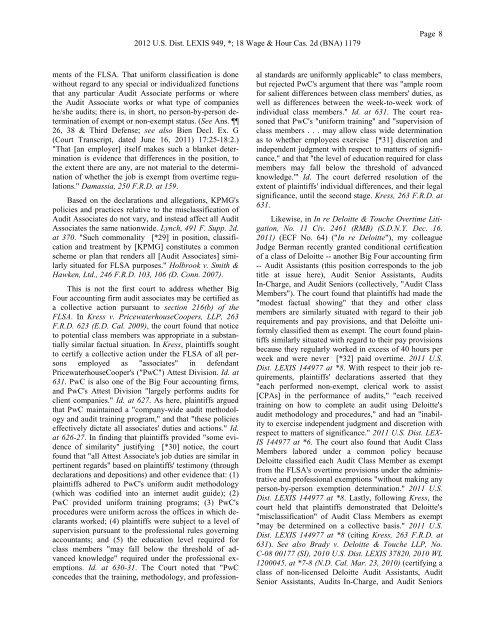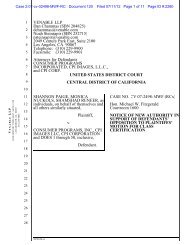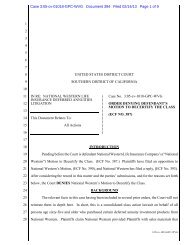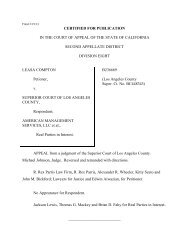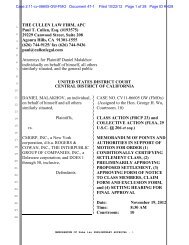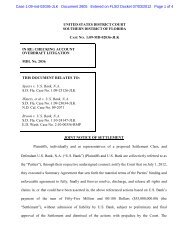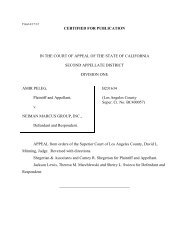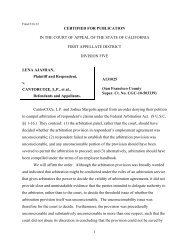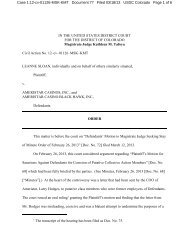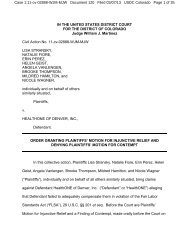KYLE PIPPINS, JAMIE SCHINDLER, and EDWARD LAMBERT
KYLE PIPPINS, JAMIE SCHINDLER, and EDWARD LAMBERT
KYLE PIPPINS, JAMIE SCHINDLER, and EDWARD LAMBERT
You also want an ePaper? Increase the reach of your titles
YUMPU automatically turns print PDFs into web optimized ePapers that Google loves.
2012 U.S. Dist. LEXIS 949, *; 18 Wage & Hour Cas. 2d (BNA) 1179<br />
Page 8<br />
ments of the FLSA. That uniform classification is done<br />
without regard to any special or individualized functions<br />
that any particular Audit Associate performs or where<br />
the Audit Associate works or what type of companies<br />
he/she audits; there is, in short, no person-by-person determination<br />
of exempt or non-exempt status. (See Ans. <br />
26, 38 & Third Defense; see also Bien Decl. Ex. G<br />
(Court Transcript, dated June 16, 2011) 17:25-18:2.)<br />
"That [an employer] itself makes such a blanket determination<br />
is evidence that differences in the position, to<br />
the extent there are any, are not material to the determination<br />
of whether the job is exempt from overtime regulations."<br />
Damassia, 250 F.R.D. at 159.<br />
Based on the declarations <strong>and</strong> allegations, KPMG's<br />
policies <strong>and</strong> practices relative to the misclassification of<br />
Audit Associates do not vary, <strong>and</strong> instead affect all Audit<br />
Associates the same nationwide. Lynch, 491 F. Supp. 2d.<br />
at 370. "Such commonality [*29] in position, classification<br />
<strong>and</strong> treatment by [KPMG] constitutes a common<br />
scheme or plan that renders all [Audit Associates] similarly<br />
situated for FLSA purposes." Holbrook v. Smith &<br />
Hawken, Ltd., 246 F.R.D. 103, 106 (D. Conn. 2007).<br />
This is not the first court to address whether Big<br />
Four accounting firm audit associates may be certified as<br />
a collective action pursuant to section 216(b) of the<br />
FLSA. In Kress v. PricewaterhouseCoopers, LLP, 263<br />
F.R.D. 623 (E.D. Cal. 2009), the court found that notice<br />
to potential class members was appropriate in a substantially<br />
similar factual situation. In Kress, plaintiffs sought<br />
to certify a collective action under the FLSA of all persons<br />
employed as "associates" in defendant<br />
PricewaterhouseCooper's ("PwC") Attest Division. Id. at<br />
631. PwC is also one of the Big Four accounting firms,<br />
<strong>and</strong> PwC's Attest Division "largely performs audits for<br />
client companies." Id. at 627. As here, plaintiffs argued<br />
that PwC maintained a "company-wide audit methodology<br />
<strong>and</strong> audit training program," <strong>and</strong> that "these policies<br />
effectively dictate all associates' duties <strong>and</strong> actions." Id.<br />
at 626-27. In finding that plaintiffs provided "some evidence<br />
of similarity" justifying [*30] notice, the court<br />
found that "all Attest Associate's job duties are similar in<br />
pertinent regards" based on plaintiffs' testimony (through<br />
declarations <strong>and</strong> depositions) <strong>and</strong> other evidence that: (1)<br />
plaintiffs adhered to PwC's uniform audit methodology<br />
(which was codified into an internet audit guide); (2)<br />
PwC provided uniform training programs; (3) PwC's<br />
procedures were uniform across the offices in which declarants<br />
worked; (4) plaintiffs were subject to a level of<br />
supervision pursuant to the professional rules governing<br />
accountants; <strong>and</strong> (5) the education level required for<br />
class members "may fall below the threshold of advanced<br />
knowledge" required under the professional exemptions.<br />
Id. at 630-31. The Court noted that "PwC<br />
concedes that the training, methodology, <strong>and</strong> professional<br />
st<strong>and</strong>ards are uniformly applicable" to class members,<br />
but rejected PwC's argument that there was "ample room<br />
for salient differences between class members' duties, as<br />
well as differences between the week-to-week work of<br />
individual class members." Id. at 631. The court reasoned<br />
that PwC's "uniform training" <strong>and</strong> "supervision of<br />
class members . . . may allow class wide determination<br />
as to whether employees exercise [*31] discretion <strong>and</strong><br />
independent judgment with respect to matters of significance,"<br />
<strong>and</strong> that "the level of education required for class<br />
members may fall below the threshold of advanced<br />
knowledge.'" Id. The court deferred resolution of the<br />
extent of plaintiffs' individual differences, <strong>and</strong> their legal<br />
significance, until the second stage. Kress, 263 F.R.D. at<br />
631.<br />
Likewise, in In re Deloitte & Touche Overtime Litigation,<br />
No. 11 Civ. 2461 (RMB) (S.D.N.Y. Dec. 16,<br />
2011) (ECF No. 64) ("In re Deloitte"), my colleague<br />
Judge Berman recently granted conditional certification<br />
of a class of Deloitte -- another Big Four accounting firm<br />
-- Audit Assistants (this position corresponds to the job<br />
title at issue here), Audit Senior Assistants, Audits<br />
In-Charge, <strong>and</strong> Audit Seniors (collectively, "Audit Class<br />
Members"). The court found that plaintiffs had made the<br />
"modest factual showing" that they <strong>and</strong> other class<br />
members are similarly situated with regard to their job<br />
requirements <strong>and</strong> pay provisions, <strong>and</strong> that Deloitte uniformly<br />
classified them as exempt. The court found plaintiffs<br />
similarly situated with regard to their pay provisions<br />
because they regularly worked in excess of 40 hours per<br />
week <strong>and</strong> were never [*32] paid overtime. 2011 U.S.<br />
Dist. LEXIS 144977 at *8. With respect to their job requirements,<br />
plaintiffs' declarations asserted that they<br />
"each performed non-exempt, clerical work to assist<br />
[CPAs] in the performance of audits," "each received<br />
training on how to complete an audit using Deloitte's<br />
audit methodology <strong>and</strong> procedures," <strong>and</strong> had an "inability<br />
to exercise independent judgment <strong>and</strong> discretion with<br />
respect to matters of significance." 2011 U.S. Dist. LEX-<br />
IS 144977 at *6. The court also found that Audit Class<br />
Members labored under a common policy because<br />
Deloitte classified each Audit Class Member as exempt<br />
from the FLSA's overtime provisions under the administrative<br />
<strong>and</strong> professional exemptions "without making any<br />
person-by-person exemption determination." 2011 U.S.<br />
Dist. LEXIS 144977 at *8. Lastly, following Kress, the<br />
court held that plaintiffs demonstrated that Deloitte's<br />
"misclassification" of Audit Class Members as exempt<br />
"may be determined on a collective basis." 2011 U.S.<br />
Dist. LEXIS 144977 at *8 (citing Kress, 263 F.R.D. at<br />
631). See also Brady v. Deloitte & Touche LLP, No.<br />
C-08 00177 (SI), 2010 U.S. Dist. LEXIS 37820, 2010 WL<br />
1200045, at *7-8 (N.D. Cal. Mar. 23, 2010) (certifying a<br />
class of non-licensed Deloitte Audit Assistants, Audit<br />
Senior Assistants, Audits In-Charge, <strong>and</strong> Audit Seniors


